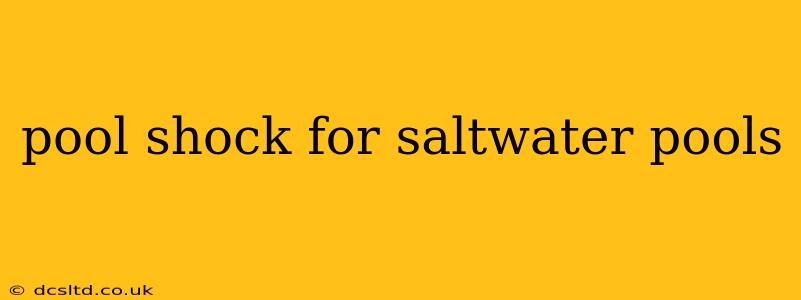Maintaining a sparkling clean and healthy saltwater pool requires a slightly different approach than traditional chlorine pools. While saltwater systems generate chlorine through electrolysis, they still benefit from the occasional boost with pool shock, also known as chlorine shock. This guide explores the nuances of using pool shock in saltwater pools, addressing common questions and misconceptions.
What is Pool Shock and Why Do Saltwater Pools Need It?
Pool shock, typically containing calcium hypochlorite or dichlor, significantly raises the chlorine level in your pool water. This rapid increase in free chlorine oxidizes contaminants like algae, bacteria, and organic matter, effectively clarifying the water and eliminating unpleasant odors. Even though saltwater pools generate their own chlorine, they can still become contaminated, necessitating the use of shock treatment. Sunlight, bather load, and debris all contribute to chlorine depletion, making regular shocking essential for maintaining a properly sanitized and balanced pool.
What Type of Pool Shock is Best for Saltwater Pools?
While both calcium hypochlorite (cal hypo) and dichlor are effective, calcium hypochlorite (cal hypo) is generally preferred for saltwater pools. Dichlor can be corrosive to pool surfaces and equipment over time, especially in saltwater environments where the salt content can accelerate this process. Cal hypo, while also potentially corrosive, is less so than dichlor and offers a more effective chlorine boost for saltwater pools. Always follow the manufacturer's instructions carefully regarding application rates.
What’s the Difference Between Cal Hypo and Dichlor?
-
Calcium Hypochlorite (Cal Hypo): A granular shock, generally considered safer for saltwater systems in the long run, providing a higher percentage of available chlorine. It can raise the calcium hardness in your pool, so regular testing and adjustments are important.
-
Dichlor: Also a granular shock, but it contains cyanuric acid, which can build up in saltwater pools over time and reduce the effectiveness of chlorine. While convenient, it is generally advised to use less frequently or avoid entirely in saltwater pools.
How Often Should I Shock My Saltwater Pool?
The frequency of shocking your saltwater pool depends on several factors, including:
- Bather load: Heavier use necessitates more frequent shocking.
- Weather conditions: Hot, sunny weather depletes chlorine faster.
- Debris: Leaves, pollen, and other debris contribute to higher chlorine demand.
A good rule of thumb is to shock your saltwater pool once a week, or more often if needed. Regular testing of your free chlorine levels is crucial. If your free chlorine levels fall below 1-3 ppm, it's time to shock the pool.
How Much Pool Shock Should I Use for My Saltwater Pool?
The amount of pool shock needed depends on the pool's size and the concentration of the shock product. Always follow the instructions on the packaging carefully. Using too much shock can be damaging to your pool equipment and swimmers, while too little will be ineffective. Many pool calculators are available online to help determine the precise amount based on your pool's volume.
Can I Use Non-Chlorine Shock in a Saltwater Pool?
Non-chlorine shock, often containing potassium monopersulfate, is designed to oxidize contaminants without adding chlorine to the water. While generally safe for saltwater pools, it primarily addresses organic matter and doesn't replace the need for regular chlorine maintenance. Consider non-chlorine shock as a supplement, not a replacement, for chlorine shock. It's useful to remove staining, but won't keep the water sanitary on its own.
What are the Signs I Need to Shock My Saltwater Pool?
Several indicators suggest your saltwater pool needs shocking:
- Cloudy water: This indicates an excess of organic matter.
- Green water: A clear sign of algae growth.
- Unpleasant odor: Chlorine depletion can lead to musty or foul smells.
- Low free chlorine levels: Regular testing is essential to monitor chlorine levels.
By consistently monitoring your water chemistry and using pool shock appropriately, you can keep your saltwater pool sparkling clean, healthy, and enjoyable throughout the swimming season. Remember to always prioritize safety and consult your pool professional for personalized advice.
